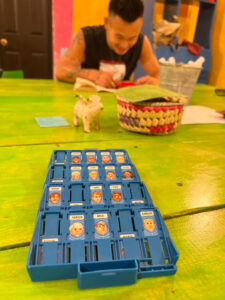
My number one goal while I was in Mexico was to take a Spanish language class. I’ve wanted to learn Spanish ever since I was in 2nd grade when a college student volunteered at our school for a couple days and taught us how to count to 15 in Spanish. I thought this skill made me unbelievably worldly, and I was determined to learn more. And I did learn more. I took Spanish classes for 3 years of middle school/high school (which was all my Mississippi public school offered). I joined the Spanish club in high school. (This mostly consisted of us going out to eat at the Mexican restaurant in town once a year.) I planned to take Spanish in college, but I ended up taking Italian instead because I hoped to study abroad in Rome. (This did NOT go well for me, and I stopped after one semester.)
As it turns out, language learning opportunities are far less accessible once a person is no longer in school. I spent years trying to maintain the little Spanish I knew with programs like Rosetta Stone and Duolingo. (I’m very proud of my current 900-day streak.) While working at Tulane University, I got an instructor’s permission to audit her Intensive Intro to Spanish class during my lunch break for four days each week. There I sat awkwardly amongst my advisees, very thankful that my grades didn’t count for anything. But in spite of all this, I still do not speak Spanish. I can read maybe a lower-elementary level of Spanish, and I can speak enough to say basic things as a tourist. But when someone speaks to me in Spanish, it’s like my brain freezes so totally that I stop even deciphering sounds.
For years, I’ve felt that I’ve reached nearly the limit of what I can learn on my own without being immersed in a Spanish speaking environment. So before my trip, I started researching Spanish language schools for adult learners in Merida. There are quite a few to choose from, all with slightly different schedules and prices, all offering different class levels and intensity. I picked the school with the best reviews, class times, and location, La Calle. I selected a class option where I would take two hours of class each evening. At $115 per week for ten hours of instruction, this was a quarter the price of comparable programs back home. It sounded too great to be true.
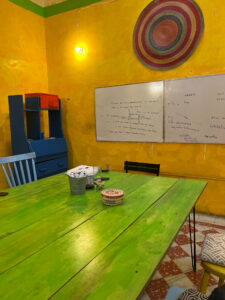
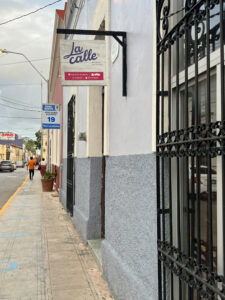
I took an online test to determine my language level and described my prior Spanish experience, then as I waited for my class to start that Monday, I started to get very anxious. The hardest thing about learning a language is not actually learning the language. The hardest thing about learning a language is being okay with willingly making a fool of yourself over and over again (or at least feeling like you are). In a lot of contexts, I’m fine with this. But something about language classes has always made me feel the most intense kind of imposter syndrome. It’s something I’ve decided very firmly that I’m bad at. A small part of me started dreading starting the class, and I even considering not going through with it. A bigger part of me knew that I’d rather feel satisfied that I did it even if I had a bad time instead of regretting missing the opportunity. So I forced myself to go.
And it was one of the absolute best experiences I’ve ever had while traveling. There was just one other student in my class, a guy close to my age who’s from China but now lives in Ireland. We had the most kind and wonderful instructor, Octavio, who spoke no English at all during class time. It made us learn how to get creative with the limited vocabulary we already knew. Because of my work schedule, I was only able to take the class for one week, so I figured I wouldn’t have enough time to learn a significant amount of new vocabulary. Instead, I learned a far, far more valuable thing—confidence. I learned that I knew far more than I gave myself credit for.
In class, the three of us got to know each other entirely in Spanish which is not something that I would have felt confident I could do before trying. We played games like Guess Who? and a game where you had to guess the celebrity your partner described, and we spent a whole lot of time laughing. And if I made a fool of myself, I had a whole lot of fun doing it.
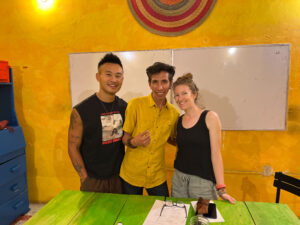
Before this experience, I hadn’t realized that language schools offer an incredible community to travelers. Li (my classmate) and I hung out after class a couple times, and he introduced me to other travelers he’d met. One couple had just spent three months living in France and taking classes at a language school there, and they’d just come to Merida to do the same thing for another three months. Li was staying for five whole weeks of classes. You cannot imagine my jealousy.
And the type of travelers that language schools attract are my favorite people to meet while traveling—the kind who are always curious and interested in immersing themselves as much as possible. There are students, backpackers, professionals, and retirees, all with different life experiences and backgrounds who come to the school for language classes. Some are just passing through for a week, and some have moved to the city permanently. The language school offered different activities most nights of the week that a lot of the students utilized. There were movie nights and salsa classes, debates and day trips. If I’m staying in another country for longer than a week in the future, I will always consider taking a class at a local language school.
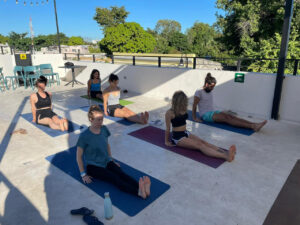
Of course time and budgets won’t always allow for language learning. An easy alternative to learn something new while traveling is to seek out hostels that offer a lot of free activities. One of my hostels offered a free salsa class, and for some reason I decided this was a thing I should try. Reader. Please understand that I am NOT a salsa dancer. I love tango dancing, but tango doesn’t require any hip thrusting. You cannot imagine my awkwardness as the overly enthusiastic dance instructor selected me to demonstrate the gyrating we were supposed to be doing upon our partners. But there was a whole lot of laughter through our collective awkwardness. And nearly all of the hostels in town offered free yoga classes. Yoga is NOT a cheap activity, so I will take advantage of free yoga anytime it’s available to me.
The more I travel, the more I feel that making sure I learn something in each place I visit is how to ensure that travel doesn’t feel compartmentalized. Going to a new city and returning only with photos and a couple souvenirs is perfectly fine. But it’s even better to return having learned to make a dish from that country or with photos from a photoshoot with a local photographer who showed you the most beautiful neighborhood in town. Or with having learned some new phrases in a new language. Or with some new dance skills that you will not be doing in public.





